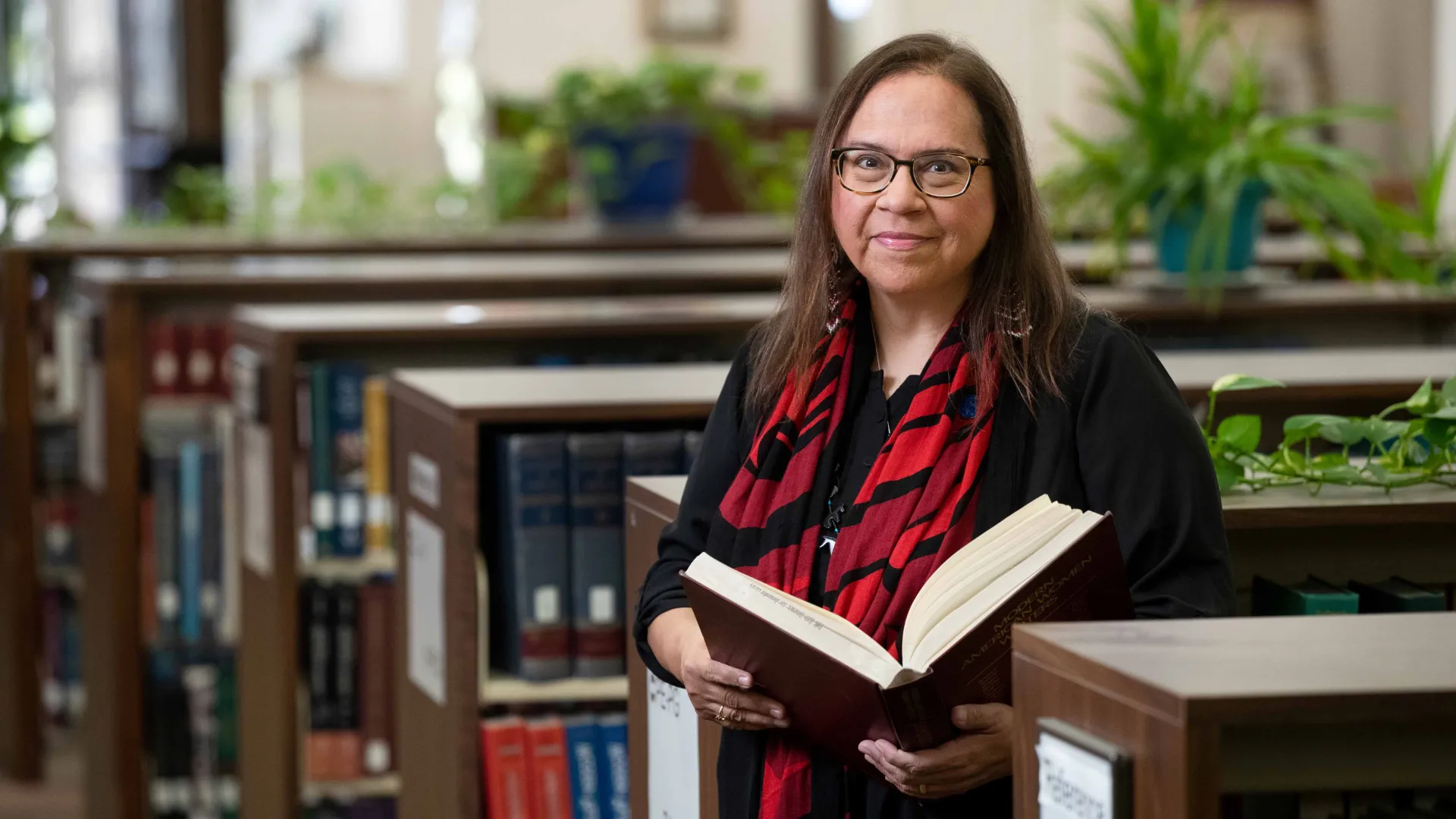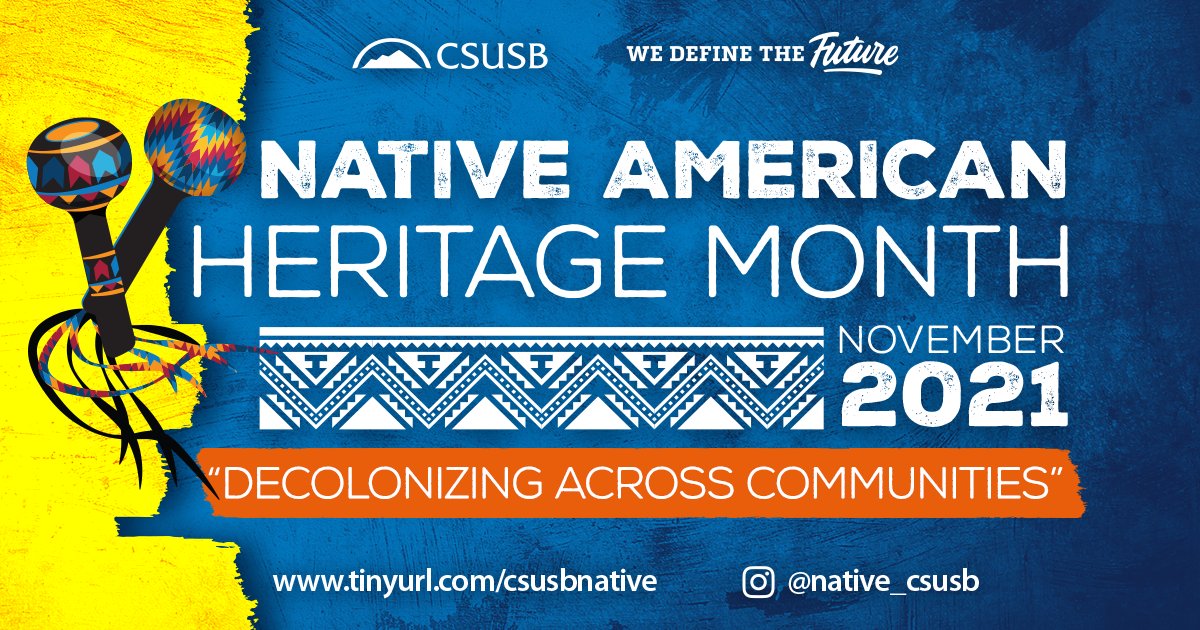Joe Gutierrez | CSUSB Office of Strategic Communication | (951) 236-4522 | joeg@csusb.edu

In “Indian Country,” says Hannah Kivalahula-Uddin (Puyallup), it is traditional to introduce yourself by sharing who your family is.
“I am from the McCloud family,” she begins. “My great uncle was Billy Frank Jr., recipient of the Presidential Medal of Freedom in 2015 by President Barack Obama for his lifelong work in Indian fishing rights. His sister, Elsie McCloud Capoeman, was my grandmother. My mother is 88-year-old Puyallup tribal elder, Gladys Rarden.”

The Cal State San Bernardino assistant professor of educational leadership and technology, and Puyallup elder from the state of Washington, holds both her Native American heritage and the value of education close to her heart.
Before coming to CSUSB in 2019, Kivalahula-Uddin earned a Ph.D. in educational psychology, three master’s degrees in education, and worked for 20 years in P-12 Indian Education with the Puyallup Tribe’s Chief Leschi Schools in Puyallup, Wash., in various roles: elementary school teacher, vice-principal, principal, education program administrator, and school counselor. She also completed a capstone research project titled, “Native American Culturally Responsive Education Program Evaluation,” where she assessed and evaluated the Bureau of Indian Education’s adult education program “Family and Child Education” at Chief Leschi Schools.
Her dissertation, “Decolonization of the Mind – A Strategy to Improve Native American Student Achievement,” explored the reasons why Native American students often struggle academically. Her findings suggest that intergenerational historical trauma is the core reason for academic failure, and that a decolonization intervention program utilizing elder Indigenous knowledge needs to be facilitated at tribal schools.
“I used the culturally responsive research methodology of oral history to help my participants begin their own personal decolonization,” said Kivalahula-Uddin, who earned her Ph.D. in 2018 from the University of Hawaiʻi at Mānoa. “Step one of decolonization is rediscovery and recovery. My participants were able to rediscover and recover our Indigenous history and recognize the truth of the injustices that occurred to our ancestors.”
After completing her dissertation and earning her doctorate, Kivalahula-Uddin knew where she wanted to go.
“I chose CSUSB because the president, Dr. Tomás D. Morales, has a sincere commitment to helping Native American students succeed,” she said. “I knew CSUSB was where I wanted to start my career as an assistant professor, and this was the only university to receive an application.”
Kivalahula-Uddin brought her knowledge and passion to CSUSB’s Ed.D. and master’s programs, where she primarily teaches graduate students and prepares them for future roles as school principals and district leaders.
And since coming to CSUSB just over two years ago, Kivalahula-Uddin has already made her mark. She has committed herself to leading and helping Native American students and the university’s Native American programs.
Kivalahula-Uddin serves as an advisor for CSUSB’s Native American Pacific Islander Association (NAPISA) club; works as a volunteer mentor for Native American undergraduate students; participates in all of the Native American university events; and serves as the 2021-22 interim director of the CSUSB Center for Indigenous Peoples’ Studies, where she also provides oversight for the CSUSB minor in Indigenous Peoples’ Studies. Additionally, she performed the opening song and prayer for CSUSB’s Native American graduation ceremony last May and led the opening song, prayer and welcome for CSUSB’s Indigenous Peoples’ Day in October.
And her work doesn’t stop there.
CSUSB’s College of Education dean, Chinaka DomNwachukwu, invited her to be a research fellow for the 2021-22 academic year for the Native American Initiative Project. The primary goal is to research, develop and propose a graduate certificate interdisciplinary program in Indigenous Peoples Studies. The exploratory goal is to research, develop and propose a CSUSB bachelor’s and master’s degree in Indigenous Peoples Studies that would be offered virtually to reach more students in a variety of communities.
And as a member of CSUSB’s Diversity, Equity, and Inclusion committee, she has given presentations to the group on equity, diversity, inclusion and decolonization of higher education. She will give another presentation on decolonization of education to the university’s College of Education early next year, with CSUSB colleague Molly Springer, associate vice president of Student Success and Educational Equity.
As for future projects, Kivalahula-Uddin plans to write and publish an article on decolonization of P-12 tribal schools and educational leadership programs, which she hopes to eventually turn into a book.
“This writing project will describe a community psychology decolonization plan derived from elder Indigenous knowledge incorporating traditional healing strategies,” she said, noting that it will be a group effort, which includes Springer; Danelle Reed, director of Puyallup Tribe’s Kwawachee Counseling Center; and Robin Starr Zape-tah-hol-ah Minthorn, program director of the University of Washington Tacoma School of Education.
“I am very excited that these Native American women scholars have agreed to publish with me,” she said. “I know that our work will make a difference in the lives of our people.”
While Kivalahula-Uddin has years of experience in the education field, specifically with the Native American community, she is appreciative of all the new opportunities that Cal State San Bernardino has provided her.
“CSUSB has given me meaningful opportunities to work as an assistant professor in educational leadership and in working with our Native American students and community,” she said. “I am very grateful to be a part of this academic community.”